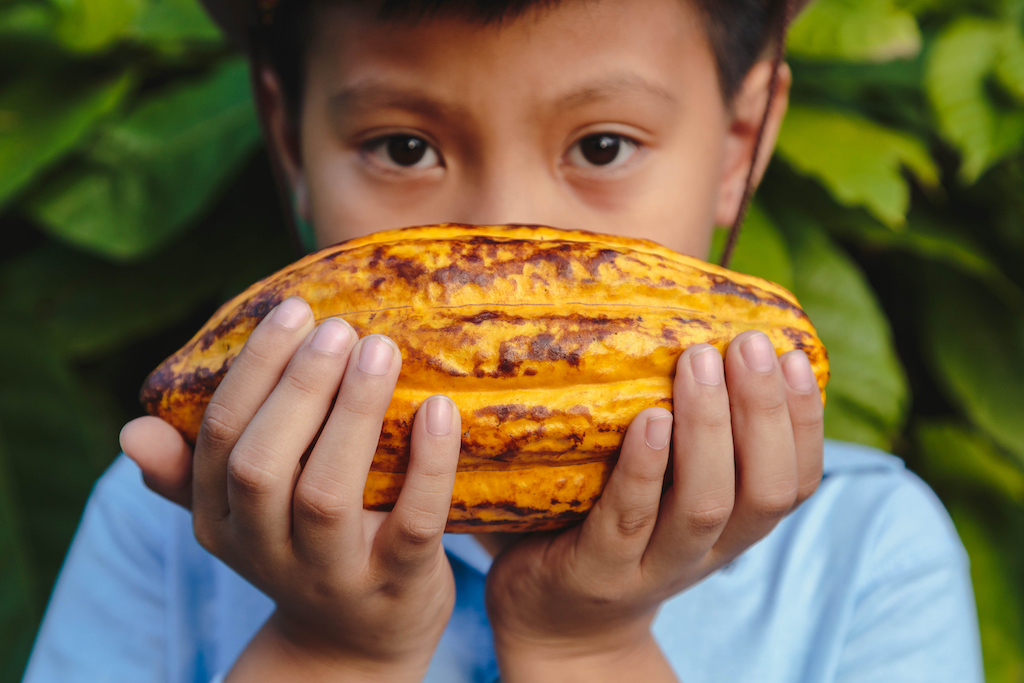Child labour proves a major focus for World Cocoa Foundation meeting

Fresh cocoa pods in the hands of a young farmer
Tackling child labour emerged as a key area for the opening sessions of the World Cocoa Foundation partnership meeting, with its global members calling on industry for combined urgent action, writes Neill Barston.
The organisation’s new president, Martin Short, offered an opening address, stating that all forms of child labour are unacceptable, but stressed that collective action from its members, civil society and regional governments was required.
He said: “In this International Year for the Elimination of Child Labour we see the plight of families driven to engage children in dangerous farming activities. All forms of child labour remain unacceptable but we need to find solutions as to how this can be overcome and in tandem with gender inequalities.
“That is why we are devoting time to ensure that we fully debate child labour. We need to define success, not by reiterating the problem nor regurgitating historical data – nor the call for ever more research – often the domain of those who think data collection is the only benchmark by which progress and success can be measured.
“All stakeholders in any cash crop supply chain should feel ownership on child labour issues. We are all responsible and no one can plead ignorance or abdicate responsibility. Just because child labour activities may fall outside your own perceived sphere of influence and control does not mean that you cannot add value and provide solutions for its eradication – and have shared accountability.”
He added that much has been achieved already with significant increases in school attendance and child protection systems in both Ghana and Ivory Coast as well as significant gains in Indonesia and Ecuador. This progress must be applauded and should be expanded.
“There are still far too many children engaged in supply chains for cocoa and other cash crops. We should also be candid and look at the root causes of why child labour has continued to plague this supply chain. At times we seem to put both the blame and the responsibility for providing a solution for the eradication of child labour solely on the shoulders of the farmers,” added Short, who explained one of the key issues was that there were a number of ‘siloed projects’ within key cocoa producing nations, which provided quick results, as with schemes designed to tackled the major issue of deforestation, yet as he noted, such ventures did not address the need for systemic change to address the underlying issues of poverty that remains a root cause of the situation.
Defining severity of child labour
A further session explored how the industry can better understand the varying issues relating to child labour, against a strong backdrop of a culture in which poverty-hit farmers (often earning less than $1 a day) routinely calling upon the assistance of family members, often younger children to assist with crop harvests, with many farmers still earning below.
Marine Jouvin, of the University of Bordeaux, explored a new study which had been commissioned by the International Cocoa Initiative, which attempted to cast a light on the many significant issues surrounding how child labour causes harm to children’s education, health and development.
As she explained, the study’s key areas included examining the effects of child labour on young people, noting that those under 12 were most at risk, as they were less likely to be able to cope with manual labour tasks, and all youths were also negatively impacted by missing school, damaging their educational prospects.
Isabelle Adam, of Touton, explained at the session that it had already placed a strong focus on engaging with communities to identify issues relating to child labour, and noted that the business is continuing to improve its remediation measures, noting the importance of the latest study for ICI in helping hone in on key areas that the company could assist communities.
The online session also heard from cocoa farmer, Bernard Kofi Mensah, who said that it was crucial that communities care for their children and not allow them to be involved in harmful agricultural activities.
However, he explained that some lighter work was considered as being an acceptable part of children’s development and helping them train for the future and learning the correct ways of farming, but he acknowledged there were still issues with harsher forms of labour.
“We must reduce child labour and I hope that we can continue to educate our people about this,” he said, noting there was a crisis within agriculture that needed resolving.
